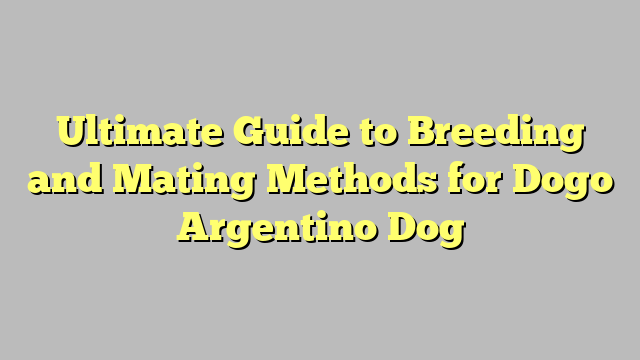
Discover the top secrets to caring for Dogo Argentino puppies from a young age with our ultimate guide.
Understanding the Dogo Argentino Breed
The Dogo Argentino is a large and powerful breed of dog that originates from Turkey. They were originally bred as livestock guardian dogs, and their primary role was to protect livestock from predators such as wolves and bears. As a result, they are known for their strong protective instincts and their ability to make independent decisions when it comes to protecting their flock. Dogo Argentino dogs are also known for their intelligence and loyalty, making them excellent companions for those who are looking for a devoted and protective pet.
Physical Characteristics
Dogo Argentino dogs are known for their large size and muscular build. They typically have a white coat, which helps them blend in with their flock and makes them easily distinguishable from predators. Their coat is also weather-resistant, which allows them to work in a variety of climates. Dogo Argentino dogs have a distinctive curved tail and a broad head with a black nose and dark, almond-shaped eyes. They are known for their agility and speed, which allows them to quickly respond to any threats to their flock.
Traits and Temperament
In addition to their protective instincts, Dogo Argentino dogs are known for their calm and gentle demeanor. They are typically good with children and other pets, especially if they are socialized from a young age. However, they can be wary of strangers and may be aloof with people they do not know. Dogo Argentino dogs are independent thinkers and can be strong-willed, so they require consistent training and socialization to ensure that they are well-behaved and obedient. Overall, they are a loyal and devoted breed that thrives in a home where they have a clear role and purpose.

Early Socialization and Training
Importance of Early Socialization
Early socialization is crucial for puppies as it helps them develop positive behavior and adapt to their environment. It is during this time that they learn how to interact with other dogs, humans, and different experiences. Proper socialization can prevent behavior problems such as fear, aggression, and anxiety in the future. Exposing puppies to various stimuli in a positive and controlled manner during their critical socialization period, which is typically between 3 to 14 weeks of age, can have a lasting impact on their behavior and temperament.
Basic Training Techniques
Basic training should start as soon as you bring your puppy home. Teaching them simple commands such as sit, stay, and come can help establish a foundation for more advanced training later on. Positive reinforcement methods, such as using treats and praise, are effective in teaching puppies new behaviors. It is important to be patient and consistent when training a puppy, as they are still learning and may not always get it right the first time. Training sessions should be kept short and fun to keep the puppy engaged and eager to learn. Consistent training and socialization during the early stages of a puppy’s life can help shape them into well-behaved and well-adjusted adult dogs.
Nutrition and Health Care
The Importance of Nutrition in Health Care
Proper nutrition plays a crucial role in maintaining good health and preventing various diseases. A balanced diet that includes a variety of nutrients such as vitamins, minerals, protein, and fiber is essential for supporting the body’s immune system, promoting healthy growth and development, and reducing the risk of chronic conditions like heart disease, diabetes, and obesity. In the context of health care, nutrition is an integral part of patient care, as it can impact recovery and overall well-being.
Integrating Nutrition into Health Care Services
Health care providers, including doctors, nurses, and dietitians, are increasingly recognizing the importance of incorporating nutrition into their services. This may involve offering dietary counseling, developing personalized meal plans, and educating patients about the role of nutrition in managing specific health conditions. Additionally, hospitals and healthcare facilities are implementing initiatives to improve the nutritional quality of meals provided to patients, recognizing the impact of good nutrition on recovery and healing.
By focusing on the relationship between nutrition and health care, individuals can make informed choices about their diet and lifestyle, leading to better overall health and well-being.
Exercise and Enrichment
Physical Exercise
Physical exercise is essential for the overall well-being of your pet. Regular exercise helps to maintain a healthy weight, improve cardiovascular health, and reduce behavioral issues related to pent-up energy. Depending on the breed and age of your pet, the type and duration of exercise will vary. For dogs, activities such as walking, running, playing fetch, and agility training can be beneficial. Cats, on the other hand, may enjoy interactive play with toys, climbing structures, and even leash training for outdoor exploration.
Mental Stimulation
In addition to physical exercise, mental stimulation is equally important for pets. Engaging your pet’s mind with activities such as puzzle toys, training sessions, and scent games can help prevent boredom and reduce anxiety. For dogs, consider introducing new tricks or obedience training to keep their minds sharp. For cats, providing opportunities for hunting and exploring, such as hiding treats around the house or using food puzzles, can provide mental enrichment. Additionally, rotating and introducing new toys and activities can prevent your pet from getting bored with their routine.
Grooming and Maintenance
Grooming and maintenance are essential aspects of caring for your pet. Regular grooming helps to keep your pet’s coat and skin healthy, while also preventing any potential health issues. It is important to establish a grooming routine early on to ensure that your pet becomes accustomed to the process. This can include brushing your pet’s coat, trimming their nails, cleaning their ears, and bathing them as needed. Additionally, regular maintenance such as flea and tick prevention, dental care, and regular veterinary check-ups are crucial for your pet’s overall well-being.
Grooming Routine
Establishing a grooming routine for your pet is important for their overall health and well-being. This can include regular brushing to prevent matting and tangles in their coat, as well as keeping their nails trimmed to a comfortable length. It is also important to clean your pet’s ears to prevent any potential infections. Additionally, bathing your pet as needed with a gentle pet shampoo can help to keep their skin and coat clean and healthy.
Maintenance Care
In addition to regular grooming, maintenance care is also crucial for your pet’s health. This can include flea and tick prevention to protect your pet from parasites, as well as dental care to prevent dental issues such as tartar and plaque buildup. Regular veterinary check-ups are also important to ensure that your pet is up-to-date on vaccinations and to catch any potential health issues early on. By incorporating both grooming and maintenance care into your pet’s routine, you can help to ensure that they are happy and healthy for years to come.
In conclusion, caring for Dogo Argentino puppies from a young age involves early socialization, proper training, regular exercise, and a nutritious diet. Building a strong bond and providing a loving environment will help them grow into well-adjusted and well-behaved adult dogs.







